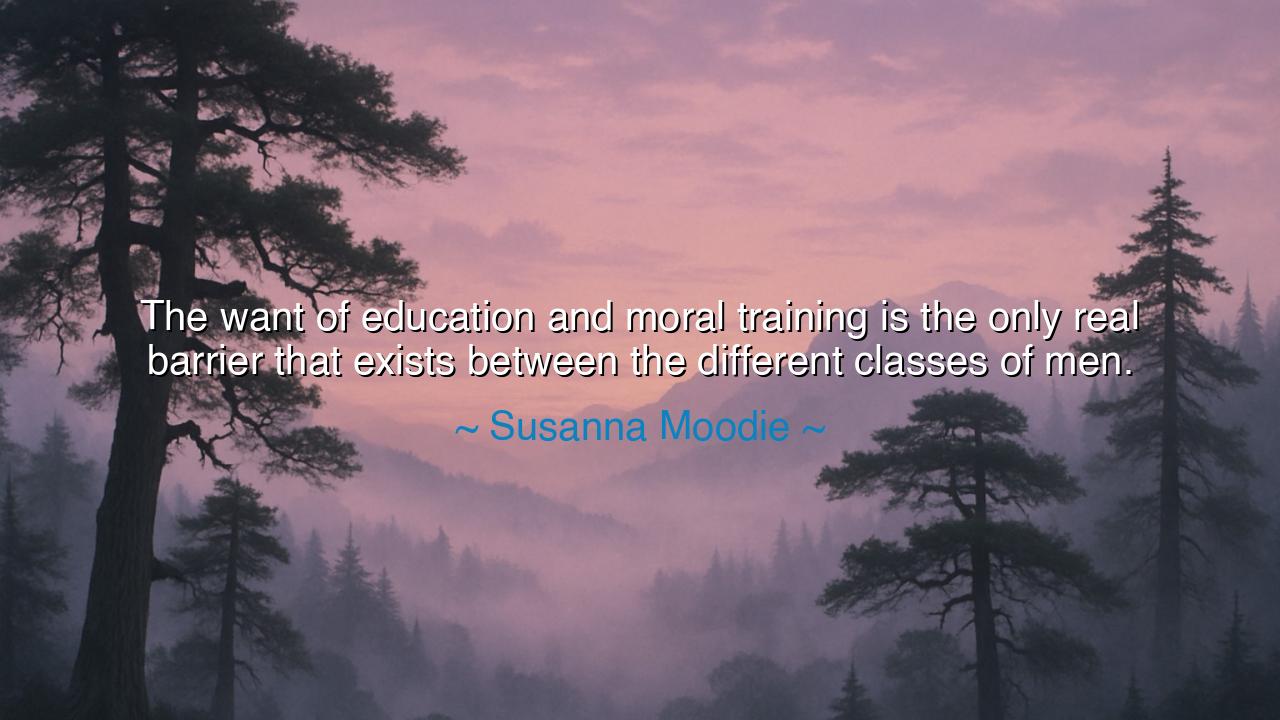
The want of education and moral training is the only real barrier
The want of education and moral training is the only real barrier that exists between the different classes of men.






“The want of education and moral training is the only real barrier that exists between the different classes of men.” — Susanna Moodie
In these noble and penetrating words, Susanna Moodie, the chronicler of early Canada and the human condition, lifts her voice above the din of her age to speak of a truth that remains eternal: that ignorance and moral decay, not wealth or birth, are the true walls dividing humanity. She looked beyond the outward distinctions of rich and poor, noble and common, and saw that these were but illusions. The only lasting gulf, she declared, is the gulf of understanding — the distance between those who have cultivated their minds and hearts, and those who have been left in the wilderness of ignorance. For where education and virtue dwell, there is equality of spirit; and where they are lacking, no crown nor coin can bridge the emptiness.
The origin of this quote lies in Moodie’s reflections on class and civilization in her writings, most notably in Roughing It in the Bush (1852), where she recounted her life as an English gentlewoman turned pioneer in the wilds of Canada. Having lived among settlers, laborers, and aristocrats alike, she came to see that the worth of a person was not measured by rank or inheritance, but by character and cultivation. In the harsh frontier, the pretensions of class quickly dissolved — survival favored not the noble by name, but the noble by nature. Thus Moodie, once schooled in the rigid hierarchies of English society, discovered in the wilderness a purer truth: that education ennobles, and morality dignifies, and together they form the only real measure of human worth.
The ancients themselves spoke this wisdom. Plato, in his Republic, taught that the divisions between men arise not from fortune but from the soul’s training — that the just man, educated in truth and guided by virtue, is superior to any tyrant, however adorned in gold. Confucius, too, declared that in the governance of men, education is the great equalizer — for through knowledge, the lowly become strong, and through moral training, the strong become just. What Moodie rediscovered in her time was what these sages knew in theirs: that the true nobility of man comes not by accident of birth, but by the discipline of the mind and the refinement of the heart.
Consider the story of Frederick Douglass, who, though born into slavery, rose through the power of education to become one of the greatest voices for freedom in the nineteenth century. Forbidden to learn, he taught himself in secret, knowing that knowledge is the path from bondage to dignity. When at last he stood before his oppressors as a free man, it was not wealth or title that gave him his power, but wisdom — and the moral force of truth. In him, Moodie’s words find their living example: the classes of men are divided not by nature, but by access to light. And once that light is kindled in the mind, no force on earth can extinguish it.
Yet Moodie’s words are not only a celebration of knowledge — they are also a warning. She reminds us that education without morality breeds cunning, not wisdom; ambition, not compassion. True education must be joined with moral training, for intellect alone can build empires, but only conscience can keep them just. History bears this lesson in the rise and fall of nations: Rome, when guided by virtue, ruled wisely; but when corrupted by luxury and greed, it collapsed into ruin. Likewise, the modern world, proud in its science and progress, stands in peril when knowledge advances faster than the human spirit. The barrier Moodie described may not be one of class today, but of conscience — the growing divide between those who use learning to uplift humanity and those who use it to dominate.
Her message, then, is both humble and revolutionary. It calls for a world where education is not a privilege but a birthright, where every child, regardless of station, is given the chance to cultivate mind and morals alike. For only when all men and women are educated can society claim to be civilized. The aristocracy of the future, Moodie suggests, will not be one of bloodlines, but of character — those who think deeply, act justly, and live nobly. The school and the hearth, not the palace, are the true foundries of greatness.
Let this, then, be the lesson handed down to all generations: that ignorance is the true poverty, and virtue the only wealth that endures. Seek knowledge not for pride, but for service. Let learning make you not superior to others, but useful to them. Teach not only the intellect, but the heart; for a society that educates without instilling morality builds clever beasts, not enlightened men. Education and moral training are the twin pillars of human unity — without them, we are divided by fear; with them, we are bound by understanding.
So, O listener, remember the wisdom of Susanna Moodie: the barriers between men are not made of stone, but of ignorance and vice. Break them not with resentment, but with learning. Lift others not by pity, but by example. For when the mind is enlightened and the spirit made virtuous, all mankind stands equal beneath the sun — and the walls that divide us crumble into dust.






AAdministratorAdministrator
Welcome, honored guests. Please leave a comment, we will respond soon